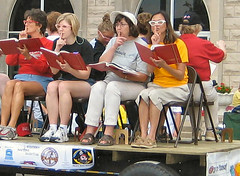
Seth Godin is one of the most insightful mainstream bloggers you can find on the Internet. His fame comes from popularizing, among other things, the ideas of “Permission Marketing” and Internet “Tribes.” The dude has been involved in marketing, development and innovation in the computer and Internet media world since he began work with Spinnaker Software in 1983.
Godin posted a particularly insightful piece in mid-August called “An End of Books” that pretty much anyone who gives a crap about where we’re headed as a global community needs to check out. Whatever your politics or your religion, books as the vessel for ideas and vision have been the single most important element of civilizations at least since the invention of the printing press.
The gist of Godin’s post is that electronic text is changing everything. Nothing new, right? We all know this — even those of you die-hard “I wouldn’t wipe my ass with a Kindle” purists. What I like about “An End of Books,” though, is that Godin, in his usual prescient and rather inimitable way, defines the terms of this change more directly, succinctly, and intelligently than anyone I’ve read on this topic so far.
What he has to say will probably not sit well with a lot of folks. According to the research I’ve read, the majority of consumers in this country still feel very uncomfortable reading e-books. I remember a time when people hated the idea of cell phones (and phones in general) and when the Sony Walkman was seen as an extremely anti-social technology. Godin points out in “End of Books” that 20 years ago he was sure the Internet was “a cheap imitation of Prodigy, but slower and with no business model.” Apparently, he doesn’t want to miss this next new train.
He writes that bookstores, publishing houses, and libraries as we know them are going to essentially go south. He also notes that the book as a “single task” technology is done for, and that bookshelves will no longer define who we are. In addition, he calls into question what he calls the “Pavlovian Response” we have to books — from that initial search at the bookstore to the curled up read to either giving the book away or shelving it in our collection.

You could read this as a sad elegy for the future that digital reading seems to promise us. I don’t see things that way. There’s no question that bookstores, publishing houses and libraries are going to need to reinvent themselves. But they’re not going away. Paperbound books are incredibly inefficient ways of delivering ideas and information. Libraries as a public good cost a helluva lot of money. They’ve morphed towards being more multi-media oriented anyway. And when Borders was kicking butt back there in the 1990s (and destroying independent bookstores) they were on the move to become more than places to buy books. Digital culture is such a vast and ever-changing river of technology. Publishers, libraries and bookstores need to expand their vision and embrace everything from leading edge video and audio experiences to story creation and research offerings for non-fiction and educational purposes.
As to the actual “reading” experience that everyone’s worried about losing, paperbound books will be around for another couple hundred years. Most likely pulp fiction “best-sellers” and news type writing will be 100% digital before the end of this decade, but literature, history, biographical studies, etc. will likely move between paper and screens depending on markets and printing advances. I will be extremely surprised if text books are still those grossly over-sized and outrageously expensive door-stops by 2020. And without doubt non-fiction and even literature will be fully connected to the Internet in ways we can’t even imagine yet.
Reading is going to be option-oriented, if you ask me. You’ll be able to simply view text, or you’ll be able to access video, graphics, and soundtracks created by the publisher and the author to enhance your experience. I read Haruki Murakami’s brilliant 1Q84 this year. It was so ripe for a soundtrack. I can also see how certain pages needed graphics that faded in showing “the little people” climbing out of the mouth of a goat or a sleeping nubile girl. It would have been fabulous to be able to view some of the sex scenes too (seriously! or at least hear them in the background) and maybe click on aerial footage of Tokyo and its highways. I’d like a fade-in and fade-out thingy too for the whole set of scenes near the end in the apartment complex alone (trying not to give anything away here, sorry). And the two moons! Oh, the two moons! What you could do with those moons.
One thing that Godin touches on that I disagree with is that “reading for pleasure” has been destroyed over the past half century. Done properly, digital books can be so much more interesting, functional, and utilitarian than those old standalone paper thingies. Imagine you have breast cancer and want to read up on it. A publisher with brains won’t be putting a memoir out there, and a separate how-to cope manual, and lists of resources, etc. They’ll produce what amounts to a multi-pronged book-application similar to a personal web site with a full range of information and reading options and links to the Internet. Or, how about a celebrity bio? Why not film clips, interviews, photos, links to purchase movies or albums, etc.?
And, finally, one of the most disconcerting problems every reader has (I don’t care what level of smarty pants you are) is vocabulary. There is nothing more painful, especially if you’re a young reader, than cruising into a forest in search of prey or getting off a boat in search of romance and adventure and realizing that you don’t know the meaning of a word. It kind of kills the mood, right? What do you do when you’re reading a paper book? Stop, track down the dictionary, look it up? I don’t think so. What a pleasure it is to just touch a word through your e-reader screen and have the definition pop up. This single innovation is more astounding to me than anything else I’ve experienced in my forty years of play in the digital world.
It’s not the end of books, folks. We’re just turning the page. Time to get creative. Time to grow a new pair.








An excellent precis David. Hopefully books will be with us for some time yet. I have a Kindle and have used it a great deal for ‘everyday’ books. I enjoy reading books on the brain and its complexity, and read works on the latest developments in particle physics. These I much prefer to read in paper form, which is what you’re suggesting. Keep up the good work.